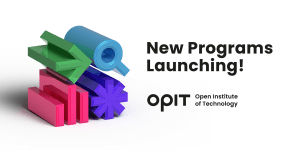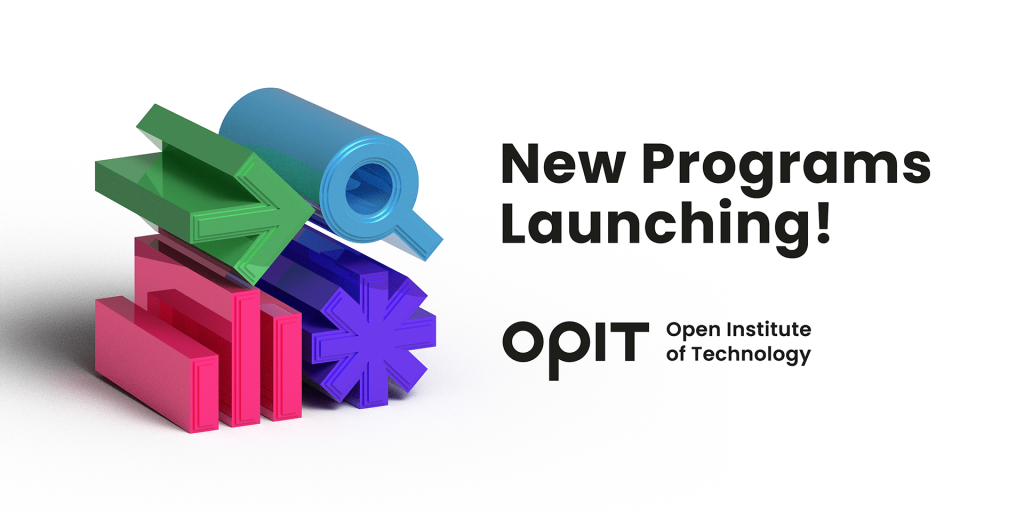

Soon, we will be launching four new Degrees for AY24-25 at OPIT – Open Institute of Technology
I want to offer a behind-the-scenes look at the Product Definition process that has shaped these upcoming programs.
🚀 Phase 1: Discovery (Late May – End of July)
Our journey began with intensive brainstorming sessions with OPIT’s Academic Board (Francesco Profumo, Lorenzo Livi, Alexiei Dingli, Andrea Pescino, Rosario Maccarrone) . We also conducted 50+ interviews with tech and digital entrepreneurs (both from startups and established firms), academics and students. Finally, we deep-dived into the “Future of Jobs 2023” report by the World Economic Forum and other valuable research.
🔍 Phase 2: Selection – Crafting Our Roadmap (July – August)
Our focus? Introducing new degrees addressing critical workforce shortages and upskilling/reskilling needs for the next 5-10 years, promising significant societal impact and a broad market reach.
Our decision? To channel our energies on full BScs and MScs, and steer away from shorter courses or corporate-focused offerings. This aligns perfectly with our core mission.
💡 Focus Areas Unveiled!
We’re thrilled to concentrate on pivotal fields like:
- Cybersecurity
- Advanced AI
- Digital Business
- Metaverse & Gaming
- Cloud Computing (less “glamorous”, but market demand is undeniable).
🎓 Phase 3: Definition – Shaping the Degrees (August – November)
With an expert in each of the above fields, and with the strong collaboration of our Academic Director, Prof. Lorenzo Livi , we embarked on a rigorous “drill-down process”. Our goal? To meld modern theoretical knowledge with cutting-edge competencies and skills. This phase included interviewing over 60+ top academics, industry professionals, and students and get valuable, program-specific, insights from our Marketing department.
🌟 Phase 4: Accreditation and Launch – The Final Stretch
We’re currently in the accreditation process, gearing up for the launch. The focus is now shifting towards marketing, working closely with Greta Maiocchi and her Marketing and Admissions team. Together, we’re translating our new academic offering into a compelling value proposition for the market.
Stay tuned for more updates!
Related posts

Source:
- Times of Malta, published on September 18th, 2025
4 min read
The gathering brought together academics and technology leaders from prominent European Institutions, such as Instituto de Empresa (IE University), OPIT itself and the Royal College of Arts, to explore how artificial intelligence is reshaping the university experience.
The OPIT AI Copilot has been trained on the institute’s complete academic archive, a collection created over the past three years that includes 131 courses, more than 3,500 hours of recorded lectures, 7,500 study resources, 320 certified assessments, and thousands of exercises and original learning documents.
Unlike generic AI tools, the Copilot is deeply integrated with OPIT’s learning management system, allowing it to track each student’s progress and provide tailored support.
This integration means the assistant can reference relevant sources within the learning environment, adapt to the student’s stage of study, and ensure that unreleased course content remains inaccessible.
A mobile app is also scheduled for release this autumn, that will allow students to download exercise and access other tools.
During examinations, the Copilot automatically switches to what the institute calls an “anti-cheating mode”, restricting itself to general research support rather than providing direct answers.
For OPIT’s international community of 500 students from nearly 100 countries, many of whom balance studies with full-time work, the ability to access personalised assistance at any time of day is a key advantage.
“Eighty-five per cent of students are already using large language models in some way to study,” said OPIT founder and director Riccardo Ocleppo. “We wanted to go further by creating a solution tailored to our own community, reflecting the real experiences of remote learners and working professionals.”
Tool aims to cut correction time by 30%
The Copilot will also reduce administrative burdens for faculty. It can help grade assignments, generate new educational materials, and create rubrics that allow teachers to cut correction time by as much as 30 per cent.
According to OPIT, this will free up staff to dedicate more time to teaching and direct student engagement.
At the Milan event, Rector Francesco Profumo underlined the broader implications of AI in higher education. “We are in the midst of a deep transformation, where AI is no longer just a tool: it is an environment that radically changes how we learn, teach, and create,” he said.
“But it is not a shortcut. It is a cultural, ethical, and pedagogical challenge, and to meet it we must have the courage to rethink traditional models and build bridges between human and artificial intelligence.”
OPIT was joined on stage by representatives from other leading institutions, including Danielle Barrios O’Neill of the Royal College of Art, who spoke about the role of AI in art and creativity, and Francisco Machin of IE University, who discussed applications in business and management education.
OPIT student Asya Mantovani, also employed at a leading technology and consulting firm in Italy, gave a first-hand account of balancing professional life with online study.
The assistant has been in development for the past eight months, involving a team of OPIT professors, researchers, and engineers.
Ocleppo stressed that OPIT intends to make its AI innovations available beyond its own institution. “We want to put technology at the service of higher education,” he said.
“Our goal is to develop solutions not only for our own students, but also to share with global institutions eager to innovate the learning experience in a future that is approaching very quickly.”

From personalization to productivity: AI at the heart of the educational experience.
Click this link to read and download the e-book.
At its core, teaching is a simple endeavour. The experienced and learned pass on their knowledge and wisdom to new generations. Nothing has changed in that regard. What has changed is how new technologies emerge to facilitate that passing on of knowledge. The printing press, computers, the internet – all have transformed how educators teach and how students learn.
Artificial intelligence (AI) is the next game-changer in the educational space.
Specifically, AI agents have emerged as tools that utilize all of AI’s core strengths, such as data gathering and analysis, pattern identification, and information condensing. Those strengths have been refined, first into simple chatbots capable of providing answers, and now into agents capable of adapting how they learn and adjusting to the environment in which they’re placed. This adaptability, in particular, makes AI agents vital in the educational realm.
The reasons why are simple. AI agents can collect, analyse, and condense massive amounts of educational material across multiple subject areas. More importantly, they can deliver that information to students while observing how the students engage with the material presented. Those observations open the door for tweaks. An AI agent learns alongside their student. Only, the agent’s learning focuses on how it can adapt its delivery to account for a student’s strengths, weaknesses, interests, and existing knowledge.
Think of an AI agent like having a tutor – one who eschews set lesson plans in favour of an adaptive approach designed and tweaked constantly for each specific student.
In this eBook, the Open Institute of Technology (OPIT) will take you on a journey through the world of AI agents as they pertain to education. You will learn what these agents are, how they work, and what they’re capable of achieving in the educational sector. We also explore best practices and key approaches, focusing on how educators can use AI agents to the benefit of their students. Finally, we will discuss other AI tools that both complement and enhance an AI agent’s capabilities, ensuring you deliver the best possible educational experience to your students.
Have questions?
Visit our FAQ page or get in touch with us!
Write us at +39 335 576 0263
Get in touch at hello@opit.com
Talk to one of our Study Advisors
We are international
We can speak in:
